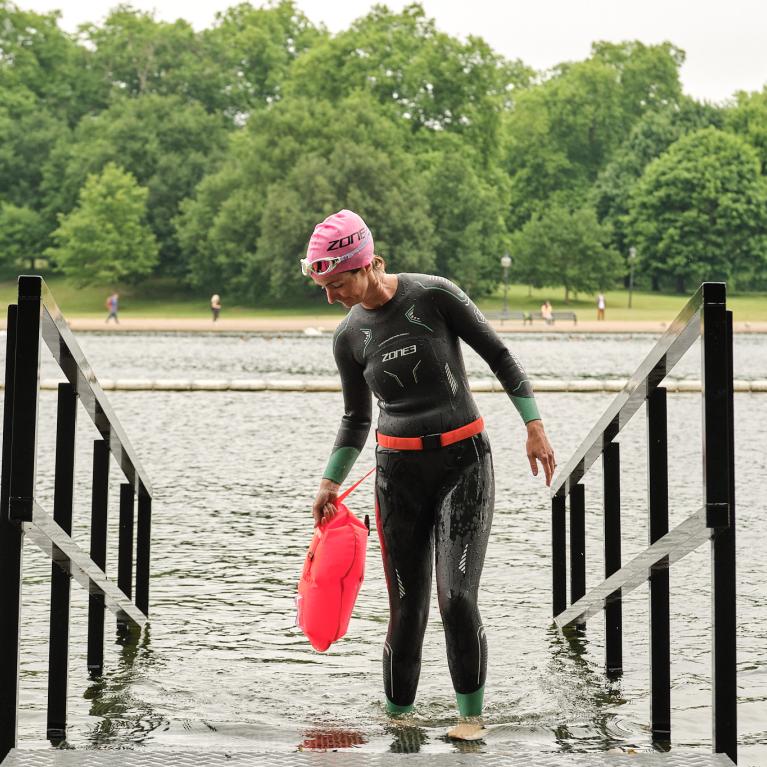
Swimming in natural environments is more than just a recreational activity - it’s an interaction with the ecosystems around us.
Whenever we swim in a natural setting, we have an impact, says Dr Rebecca Olive, a Senior Research Fellow at RMIT University in Melbourne, who studies how recreational sports such as swimming shape our relationship to nature.
“It might be that your sunscreen has washed off your skin and become part of the film on the surface. You might have crushed some plants underfoot or peed out antibiotics or analgesics [medication] and left them behind in the water,” she says.
There is a lot of wonderful research being done on how swimming in open water - such as rivers, lakes or the sea - can benefit our physical and mental wellbeing, says Rebecca, but it’s important to also consider our impact on these wild places that make us feel so good and to ask what we can do for them in return.
Here are six ways open water swimmers can have a positive impact on rivers, lakes, and oceans.
1. Do a mini litter pick
It’s unfortunately all too common to witness some form of plastic pollution or other litter when swimming in a wild setting, but swimmers can take inspiration from the Australian charity Take 3 For The Sea, which encourages water users to pick up three pieces of rubbish whenever they visit a beach, river or lake. It takes no time at all, and if there are no nearby waste bins, take the litter home with you. If you see plastic in the water, stuff it into your wetsuit or swimsuit, if you can, and dispose of it on the shore.
2. Watch your step
Look out for birdlife when swimming in lakes and rivers and try not to disturb them, by watching where you put your feet – especially around nesting sites – and not making too much noise in their vicinity. Take designated footpaths and try not to erode the banks when you enter and exit the water – use a manmade structure if they exist. Also avoid disturbing riverbeds by keeping your feet off the bottom as much as you can, as stirring up silt and sediment can be detrimental to breeding fish and amphibians.
3. Use the toilet before you get in
To minimise your impact on the local ecosystem, use public toilets where possible rather than peeing in rivers, lakes, or sea. Also use minimal lotions and beauty products before you get in; reef-safe sunscreen tends to contain less environmentally harmful chemicals.
4. Invest in sustainable swimwear
Buying your swimwear from brands that aim to have a positive impact on the environment, by creating long-lasting swimsuits, is a smart choice, especially as a recent Greenpeace study showed the damage that discarded UK fast fashion is having on wetlands in Ghana. Also look for companies using recycled fabrics, such as Econyl – an alternative to nylon made from waste products, such as fishing nets. Sustainable swimwear brands include Finisterre, Patagonia, Batoko, Davy J, Casa Raki, Tide and Seek and Made of Water.
And if you need a wetsuit, consider renting rather than buying one – ZONE3 offers short and long-term wetsuit rental options.
5. Take public transport
Where possible use trains, buses, and bikes, or hike to reach outdoor swimming spots rather than driving. If driving is your only option, consider carpooling with a friend.
6. Support clean water advocates
Backing charities that campaign against water pollution – through donations, in-water protests or by writing to MPs – is a great way to protect lakes, rivers, and oceans. These include Surfers Against Sewage, whose Safer Seas & Rivers app allows water users to check for sewage discharges in real time; ocean conservationists Oceana; clean river advocates River Action and The Rivers Trust; and regional campaign groups such as SOS Whitstable and Save Windermere.
“We can’t be well if the water isn’t well,” says Easkey Britton, an Irish sea swimmer, surfer and marine scientist who wrote the book Ebb and Flow: Connect with the Patterns and Power of Water. “We shouldn’t see water as a commodity but life itself, something sacred and medicinal that deserves our protection.”
Talk to your friends – those who swim and those who don’t – about the threats to lakes, rivers, and oceans. Using your voice is one of the most powerful ways you can have a positive impact.
Written by Sam Haddad. Sam is a freelance journalist based in Brighton, she's been writing about sport and the outdoors for over 20 years.